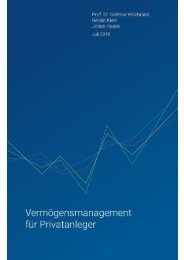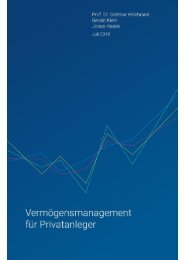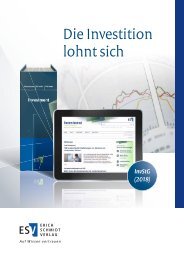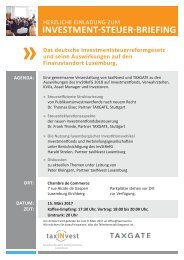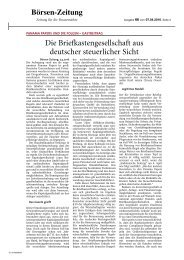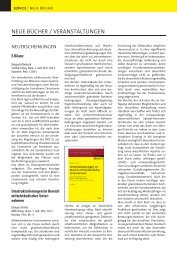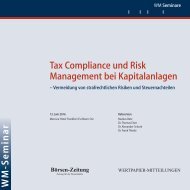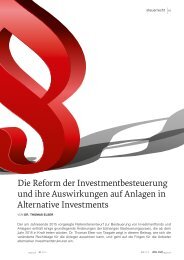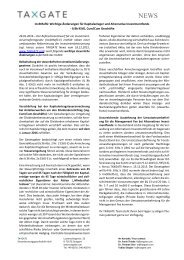You also want an ePaper? Increase the reach of your titles
YUMPU automatically turns print PDFs into web optimized ePapers that Google loves.
Q&A NORTH AMERICA
C A N A D A
some new (but more limited and focused) stimulus measures to help
the economy restart. However, on a longer-term basis the unpresented
deficits and resulting level of debt will need to be addressed – likely
through a combination of reduced spending and tax increases. However,
this will be challenging, as it will need to be done in a way that
does not impair Canada’s competitiveness with other countries or impede
growth.
If these come into force, how will the industry look in the future?
These changes are expected to impact in-bound and out-bound financing
within corporate groups, the location of debt within corporate
groups, as well as corporate capital structures. As is the case with
other BEP driven initiatives, we anticipate a material rise in the need
for transfer pricing services, international tax consulting services, and
compliance services.
How would you describe the tax controversy landscape in your
region/jurisdiction?
The past few years have seen the Canada Revenue Agency become increasingly
aggressive and ambitious in its efforts to ensure compliance
with Canada’s tax laws and generate tax revenues. The Canada Revenue
Agency is raising large reassessments and leaving taxpayers to
dispute them through the lengthy administrative appeals process and
litigation in the courts. With the expected deficits and shortfalls in
revenue due to COVID-19, we anticipate that the Canada Revenue
Agency will become even more sensitive to preserving Canada’s tax
base, so we expect this trend to continue. More than ever, it is important
for taxpayers to plan their affairs and transactions carefully to
minimize tax disputes, and to manage disputes strategically when they
do arise.
Do you expect tax procedures in your region to move towards
common standards or diverge in the future?
We expect the tax procedures in Canada to continue to move towards
a common standard in the future.
Is the global drive towards regulation going to affect tax
practice? If yes, in which areas?
The global drive towards regulations will affect tax practices because it
will increase the standard for compliance and the volume of compliance.
This will increase the importance of tax reporting and compliance work
and the need for the right resources to serve clients. This will make operating
nationally and using technology all the more critical.
What do you see as direct impact of COVID-19 in your practice?
COVID-19 has highlighted the importance of being agile and digital.
Our practice pivoted quickly to a work-from-home model and experienced
less of a disruption because our practitioners regularly work
virtually with teams across the country. Our team has stuck together,
supported each other, and adapted to meet the needs of our evolving
situation.
The current pandemic has created major disruptions and sparked
a sense of urgency for changes including a massive update in digital
transformations. The accelerated pace of these changes will require
businesses to outsource their tax functions or to be nimble in how
they adapt. Our advisory and consulting services can help with this
and support clients’ entire businesses throughout this transition, including
the evolution of their business model. We are already seeing
an increase in demand for our grants an incentives team, employment
law team, and our restructuring business as they help clients navigate
their digital transformation journey.
This document has been prepared solely for the purpose of publishing in the 2020 Guide to the World’s Leading Tax Advisers and may not be used for any other purpose. This document
and its contents may not be reproduced, redistributed or passed on, directly or indirectly, to any other person in whole or in part without Deloitte’s prior written consent.
Deloitte refers to one or more of Deloitte Touche Tohmatsu Limited (“DTTL”), its global network of member firms, and their related entities (collectively, the “Deloitte organization”).
DTTL (also referred to as “Deloitte Global”) and each of its member firms and related entities are legally separate and independent entities, which cannot obligate or bind each other in respect
of third parties. DTTL and each DTTL member firm and related entity is liable only for its own acts and omissions, and not those of each other. DTTL does not provide services to
clients. Please see www.deloitte.com/about to learn more.
This communication contains general information only, and none of Deloitte Touche Tohmatsu Limited (“DTTL”), its global network of member firms or their related entities (collectively,
the “Deloitte organization”) is, by means of this communication, rendering professional advice or services. Before making any decision or taking any action that may affect your finances or
your business, you should consult a qualified professional adviser.
No representations, warranties or undertakings (express or implied) are given as to the accuracy or completeness of the information in this communication, and none of DTTL, its member
firms, related entities, employees or agents shall be liable or responsible for any loss or damage whatsoever arising directly or indirectly in connection with any person relying on this communication.
DTTL and each of its member firms, and their related entities, are legally separate and independent entities.
© 2020. For information, contact Deloitte Global.
TAX EXPERTGUIDES 91





